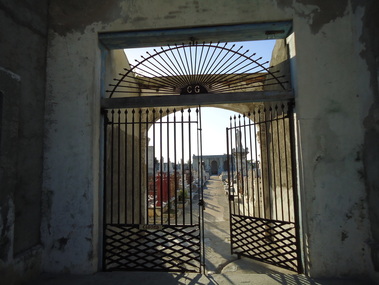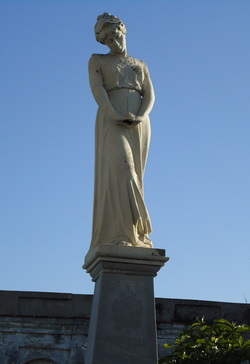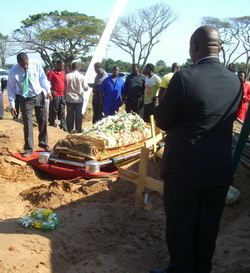 Cemetery doors mark the boundary between the living and the dead.
Cemetery doors mark the boundary between the living and the dead. What happens when there is no community?
 What can we do for our departed loved ones?
What can we do for our departed loved ones? She told me that her father had been initiated in Africa. Although she didn't give me a lot of details, I assume her father had not stayed in close touch with his godfather, and he had not formed a religious community of his own in the States. Whether he knew about the need for Itutu or not, I'm not sure, but he didn't communicate it to his family. Sadly, the daughter wasn't sure what to do, and I couldn't really help her. Without initiated priests and priestesses to carry out the ceremony, Itutu can't be performed. The daughter, as an aleyo (outsider) can't do it for her father, even if she could find instructions in a book or on the internet. The ceremony is meaningless unless it's performed by priests and priestesses, because there has to be communication with the Orichas, and outsiders can't use the divination tools that permit that kind of communication. There's no way for the daughter to know what the Orichas want, so she can't follow instructions and deal with them in the "proper" way. She can only treat them with respect as sacred objects, do what she thinks best with them, and hope the Orichas understand. Whether she chooses to keep them for herself, give them away, drop them into the sea, bury them in a forest, or put them in her father's casket, she can never be sure that's what the Orichas wanted. She has to guess, and do the best she can under the circumstances. Naturally, this makes her feel bad, not knowing what to do and being powerless to help, but it's not her fault. I told her the Orichas are forgiving in these circumstances. They understand human error and don't blame us if we make mistakes in good faith.
Let your loved ones know
 Returning the body to the earth
Returning the body to the earth My reason for writing this blog is to tell you that if you're a Santero/a and have Orichas in your home, you need to tell your friends and family that Itutu should be done for you. Give them the name of your godparent or yugbona, give them the telephone number or contact information so they can reach that person, if they don't know him or her. If possible, have money set aside for the Itutu ceremony. It may involve travel if the godparent lives far away. Don't expect your godparents and godsiblings to pay for it. There are always costs associated with any elaborate Ocha ceremony, and just like you have to pay the funeral home to prepare your body for burial, there are costs involved in the Itutu ceremony to prepare your soul for departure from the earth.
If you know a family member has received Orichas, even if you don't share his or her religious beliefs, ask about what should be done. If your family member is an initiated priest or priestess, he should be aware of the need for an Itutu ceremony, and he be able to tell you about it in general terms. If your friend or relatives have elekes (necklaces) and the warriors only, Itutu is not necessary. These should be returned to the godparent, if possible, and if not, disposed of in a respectful way.
Lucumi beliefs about the afterlife
The energy of the Orichas is contained in the "otanes" (stones) and other "tools" or instruments inside the soperas. These are symbols of the Orichas, not the Orichas themselves. But, still they need to be treated as sacred objects and dealt with in a respectful way. Itutu allows the Orichas to speak and say what should be done with their symbols. If for some reason Itutu cannot be done, the important thing is to treat these symbols as sacred, and dispose of them in some way that feels respectful to you. If they can be returned somehow to nature, that is the best that an uninitiated person can manage. But if Itutu can be performed, that is always better.
When we pronounce the name of a person who has departed this world, we say: Igbae bayen torum as a way to honor and remember them. All of our prayers begin with a recitation of the names of our departed elders, so they are never lost to the family or community.
Igbae bayen torum Ekun Dayo, que descanses en paz.
 RSS Feed
RSS Feed
